Zach Blas is an artist, filmmaker, and writer whose practice spans moving image, computation, theory, performance, and science fiction.
Blas engages the materiality of digital technologies while also drawing out the philosophies and imaginaries lurking in artificial intelligence, biometric recognition, predictive policing, airport security, the internet, and biological warfare. The Doors (2019) is an immersive environment that imagines a new psychedelic age fueled by AI, nootropics, and tech culture. SANCTUM (2018) is a sex dungeon-cum-detention center that recasts security and surveillance through BDSM. A film installation, Contra-Internet: Jubilee 2033 (2018) follows author Ayn Rand on an acid trip, in which she bares witness to a dystopian future of the internet. im here to learn so :)))))) (2017), a four-channel video installation and collaboration with Jemima Wyman, resurrects Microsoft AI Tay to consider the gendered politics of pattern recognition and machine learning. Facial Weaponization Suite (2012-14) consists of amorphous masks that demand opacity against biometric facial recognition systems.
Blas has exhibited, lectured, and held screenings at venues internationally, including the de Young Museum, Tate Modern, Walker Art Center, 2018 Gwangju Biennale, the 68th Berlin International Film Festival, Matadero Madrid, Los Angeles County Museum of Art, Art in General, Gasworks, Van Abbemuseum, Institute of Contemporary Arts Singapore, e-flux, Whitechapel Gallery, ZKM Center for Art and Media, and Museo Universitario Arte Contemporáneo. His practice has been supported by a Creative Capital award in Emerging Fields, the Arts Council England, Edith-Russ-Haus für Medienkunst, and the UK Arts and Humanities Research Council.
His work is in the collections of Museo Universitario Arte Contemporáneo, National Museum of Modern and Contemporary Art, Korea, and Whitney Museum of American Art. Blas’s practice been written about and featured in Artforum, Frieze, ArtReview, BBC, The Guardian, and The New York Times.
Blas’s writings can be found in the collections You Are Here: Art After the Internet, Documentary Across Disciplines, Queer: Documents of Contemporary Art, as well as e-flux journal and various exhibition catalogues. With Melody Jue and Jennifer Rhee, he is co-editor of the anthology Informatics of Domination, forthcoming from Duke University Press. His artist monograph Unknown Ideals is published by Edith-Russ-Haus für Medienkunst and Sternberg Press.
Blas is an Assistant Professor of Visual Studies in the Daniels Faculty of Architecture, Landscape, and Design at the University of Toronto.
Group Exhibition, Eyebeam In Objects (2015)
Curated by Roderick Schrock
Featuring the works of:
Zach Blas
Contra-Internet Inversion Practice #2: Social Media Exodus (Call) 2015, eight prints on paper from digital screen-grabs edition of 5 plus 2
AP Contra-Internet Inversion Practice #2: Social Media Exodus (Response), 2015 HD video with sound, 3 min 20 sec (loop) edition of 5 plus 1 AP
Contra-Internet Inversion Practice #1: Constituting an Outside (Utopian Plagiarism), 2015 HD video with sound, 5 min 57 sec (loop) edition of 5 plus 1 AP
Contra-Internet Inversion Practice #1: The End of the Internet (As We Knew It), 2015 staple-bound paperback book, 8.25 x 5.5 x .25 open edition
Contra-Internet Totality Study #1: Internet, a definition, 2015 vinyl lettering in “web safe” font applied to wall dimensions variable
Contra-Internet Totality Study #2: Internet, a .gif triptych, 2015 three animated .gif files (display devices not included) edition of 5 plus 2 AP
THE WORK
Comprised of multiple series, Contra-Internet critiques the Internet as a hegemonic descriptor for digital networking and premier arena of political control.
This ongoing project also documents and speculates upon network alternatives that social movements are developing globally, such as autonomous mesh networks, encryption tactics, and darknets.
Inspired by the transgender theorist Beatriz Preciado’s Manifesto contrasexual, Contra-Internet is oriented from a feminist and queer perspective, in an effort to unite such political positions with a hacker ethos.
The works aim to function as an expansive conceptual, practical, and experimental framework for refusing the neoliberal logic of “the Internet” while building alternatives to its infrastructure.
The Inversion Practices sub-series is comprised of short, performative videos that utilize various conceptual-technical tactics to abandon and subvert the Internet. Totality Studies expose the Internet as a socio-technical totality for which it is extremely difficult to imagine an outside or alternative.
